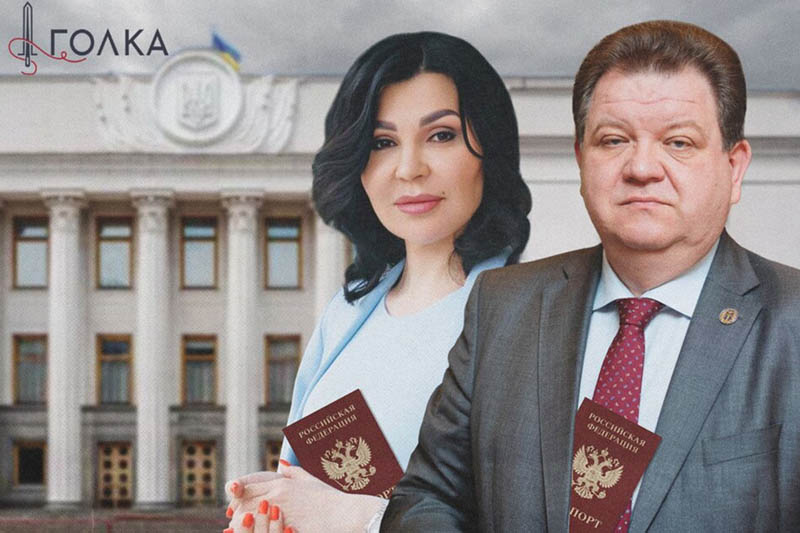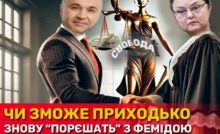Российский паспорт у чиновников и судей: почему государство проигрывает в судах?


В случае с Медведчуком дело было быстро решено, а с гражданством судьи Львова — нет…
Начало года началось с двух резонансных дел. Суд восстановил в должности одиозного судью Верховного Суда Богдана Львова, у которого обнаружили паспорт РФ.
Но здесь впереди еще апелляция и уже назначена тройка судей в Шестом апелляционном административном суде: Андрей Кучма, Владимир Алименко и Людмила Белова.
А вот во втором громком деле ситуация хуже. Речь о экс-чиновнице Минюста Марине Прилуцкой, которая, по данным СБУ, добровольно получила гражданство РФ в оккупированном Крыму. Верховный Суд отправил дело на повторное рассмотрение и тем самым остановил действие решения апелляции.
«Председатель Верховного Суда Станислав Кравченко накануне заседания по делу Богдана Львова заявил, что увольнение его коллеги — это была якобы частная инициатива бывшего председателя Верховного Суда Князева и еще поставил под сомнение, будут ли подавать апелляцию, если проиграют. Это выглядело как саботаж. После резонанса в СМИ апелляцию таки направили и общественность должна следить, чтобы суды не зацементировали тот «стандарт», когда гражданство РФ можно будет доказать только при наличии паспорта или справки с печатью от РФ, что этот человек — ее гражданин. Это абсурд и прямая угроза нацбезопасности. Надеемся, что суды высших инстанций поставят нацбезопасность и здравый смысл выше чьих-то коррупционных интересов. А государство в целом — срочно разработает механизм, который поможет ускорить решение таких вопросов», — отмечает председатель правления Фонда Dejure Михаил Жернаков.
Народный депутат Роман Бабий (межфракционное объединение «Умная политика»), член комитета по вопросам правовой политики, объясняет почему возникают проблемы: «Раньше информацию о гражданстве мы получали по дипломатическим каналам. Но с РФ дипломатические связи давно разорваны. Фактически при рассмотрении таких судебных дел имеем ситуацию «слово против слова», классических веских доказательств наличия гражданства РФ у СБУ нет. В такой ситуации суды могут оценить и другие доказательства, но и их не всегда бывает достаточно. Учитывая то, какая сложилась ситуация с последними судебными делами, проблема действительно существует и она достаточно критична. Возможно, стоило бы менять стандарты доказывания в этой категории дел. Нужны срочные изменения в действующее законодательство, но над разработкой самого механизма проверки законодателям еще нужно работать».
Журналистский проект «Схемы», который разоблачил российское гражданство судьи Львова отмечает, что СБУ предоставило убедительные доказательства. «Там была информация и о том, когда Львов получал гражданство, и когда возобновлял паспорт. То есть в суд доведена подробная фактическая информация, которая соответствует тому, что было в нашем материале», — отмечает Наталья Седлецкая, главный редактор «Схем» («Радио Свобода»). И добавляет, что если в кассации Львов выиграет, то все другие судьи с российским гражданством поймут, что нет никаких препятствий, чтобы, имея российский паспорт, восстановиться в должности.
Дело с судьей Львовым не уникально. Так, есть еще одна судья Валентина Симоненко (ныне в отставке) и судья Донецкого окружного административного суда Людмила Арестова, у которых тоже «Схемы» обнаружили российское гражданство. К слову, муж Арестовой, адвокат Сергей Васильев присутствовал на судебных заседаниях по делу Львова, и он же представляет интересы своей жены-судьи.
Общественная инициатива «Игла» обратилась в Службу безопасности Украины за комментарием. И здесь также говорят: необходимы законодательные изменения.
«СБУ, как это было с судьей Богданом Львовым, может лишить таких лиц допуска к государственной тайне. Также Служба информирует государственные органы о потенциальной или имеющейся угрозе. Ведь центральным органом исполнительной власти, осуществляющим реализацию государственной политики в сфере гражданства, является Государственная миграционная служба Украины. Позиция СБУ однозначна: потенциальное наличие гражданства РФ у судей и должностных лиц является угрозой для нацбезопасности, особенно в условиях войны. При этом информация, собранная оперативным или контрразведывательными средствами, которыми располагает спецслужба, должна быть подтверждена дипломатическим путем. Поэтому вопрос иностранного гражданства у должностных лиц и представителей судебной ветви власти требует комплексного решения, в том числе и на законодательном уровне», — сообщают в пресс-службе СБУ.
Народный депутат Соломия Бобровская («Голос») соглашается: наличие российского гражданства несовместимо не только с выполнением функций судьи, но и любых функций государства или местного самоуправления. Но при этом акцентирует внимание на том, что здесь есть серьезные предостережения, если менять законодательство: «Это создает коррупционные риски и рычаг влияния спецслужбы на судебную ветвь власти, которая априори должна быть независимой. В любом состязательном процессе, как уголовный, должна быть доказательная база, которую получили тем способом, который предусмотрен законом. Спецслужбы наделены полномочиями на осуществление досудебного расследования, контрразведывательной деятельности. Все эти процессы должны быть сбалансированы, иначе мы получим судей, которые под страхом обвинений в наличии российского паспорта, будут принимать те решения, которых потребуют в СБУ и не факт, что они будут отвечать интересам государства и общества. Это сейчас часть СБУ славится успешными операциями против врагов, но по состоянию на март 2022 года именно в этой структуре, по словам секретаря СНБО, было больше всего предателей».
Бобровская убеждена, что в судебном процессе проблема возникает не из-за отсутствия оригинала паспорта, и наличие российского гражданства можно доказать другими способами.
В государстве действительно есть еще один механизм, чтобы решить этот вопрос. Так, если дело с двойным гражданством политическое, то оно решалось достаточно быстро. Речь о Викторе Медведчуке, Тарасе Козаке, Андрее Деркаче, Ринате Кузьмине, которых президент лишил украинского гражданства, поскольку у них обнаруживали гражданство другой страны. И, кстати, меньше чем за год до полномасштабной войны, народный депутат Олег Дунда («Слуга народа») обращался, чтобы проверили народных депутатов: есть ли у них второе гражданство. Но пока дошло до полномастабного вторненя — этого так и не сделали.
Что касается судьи Львова, то здесь даже есть петиция к президенту, которая больше года назад набрала необходимое количество голосов. «Мною дано поручение Комиссии при президенте Украины по вопросам гражданства изучить затронутый в электронной петиции вопрос, проверить наличие оснований для прекращения гражданства Украины Богдана Львова и по результатам рассмотрения принять соответствующее решение. О результатах рассмотрения затронутых вопросов автор электронной петиции будет проинформирован», — говорится в ответе Владимира Зеленского на петицию.
Прошел год, а Львов — до сих пор гражданин Украины. Советник руководителя Офиса президента Михаил Подоляк пока не комментирует, почему в случае с Медведчуком и Деркачем дело с гражданством на уровне Банковой решено, а относительно гражданства судьи Львова — нет.
Recent Posts
Сбежавший в Швейцарию блогер Станислав Домбровский просит прощения у украинцев
Одесский трэш блогер Стас Домбровский, который в последнее время проживает в Швейцарии, записал видеообращение к…
Александра Устинова и атака на руководство АОЗ: что стоит за волной критики
Александра Устинова, народная депутат, которая в последние дни активно атакует Агентство оборонных закупок (АОЗ) возможно…
Журналисты показали имение киевской судьи, закрывшей дело Приходько
Свобода "под ключ" или манипуляция правосудием? Борис Приходько – нацбанкир времен Януковича и действующий нардеп…
Судьи вне закона
В течение последних трех лет внимание общественности если и бывает приковано к судам, то гораздо…
Артем Ляшанов и bill_line спасают репутацию через суд
Финтех-компания столкнулась с обвинениями в отмывании денег игорной мафии. ООО «Тех-Софт Атлас» (ТМ «bill_line») и…
Криптобиржа WhiteBIT: как Владимир Носов и «регионалы» Шенцевы отмывают деньги и помогают спецслужбам России
Владимир Носов в Украине пытается позиционировать себя как респектабельный бизнесмен и хозяин криптобиржи WhiteBIT. Однако…


